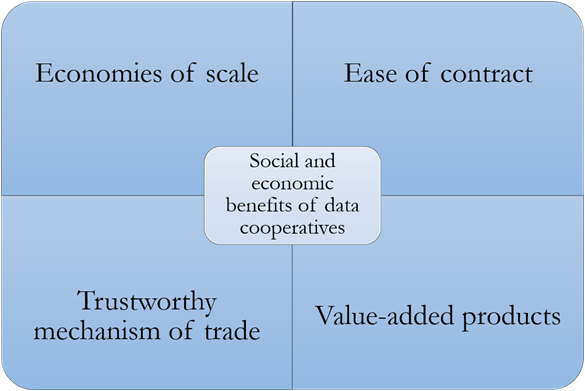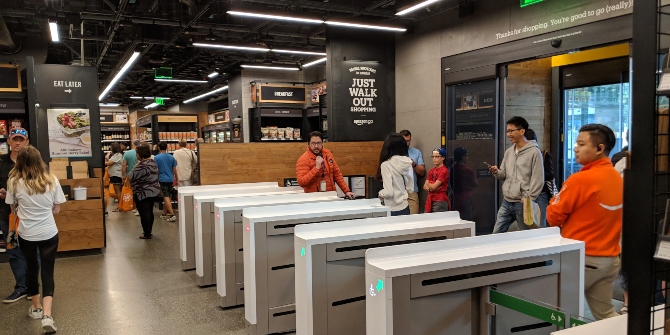Data cooperatives are emerging to empower consumers amidst a fast-changing data governance landscape. But they are not alone, and IT-enabled data marketplaces can be effective competitors. Sameer Mehta, Milind Dawande, and Vijay Mookerjee write that data cooperatives are not indispensable. They suggest four steps for data cooperatives to sustain themselves and thrive in this competitive market.
Technology firms are increasingly collecting an alarming amount of personal data that includes information on various aspects of our lives. Consequently, these firms now wield enormous power in the digital economy. To counter and rebalance the skewed power dynamics, a host of data cooperatives are on the rise; examples include Driver’s Seat, Fairbnb, and Data Worker’s Union, among others.
Benefits of data cooperatives
Data cooperatives are organisations that collect data from its members, process and monetise the pooled data, and compensate the members for their individual contributions. These cooperatives establish an ecosystem of trust among its members and are attractive to consumers for three basic reasons:
Control. By design, the members of a data cooperative have control over the quality as well as the quantity of data they share with the cooperative.
Bargaining power. Personal data of an individual by itself does not have much value (Pentland and Hardjono, 2020). By aggregating members’ data, a cooperative can command a higher price from data buyers.
Compensation. For sharing their data, members usually receive monetary compensation as opposed to in-kind services. The larger the size of a cooperative, the higher its bargaining power is, and leads to higher compensation for its members.
The economics of data cooperatives
The idea of individuals forming a cooperative is not new and has been around for the past century and a half (Birchall, 1997). Like cooperatives for physical goods, data cooperatives offer several social and economic benefits to various stakeholders.
Economies of scale. As an organisational form, a cooperative naturally enables supply- and demand-side economies of scale (Kenkel, 2019). On the supply side, they pool data of individual members in a cost-effective way. On the demand side, retail firms save aggregation and processing costs by procuring data in huge quantities from the cooperative.
Ease of contract. Instead of engaging in a one-to-one relationship with individual members, firms can set up a single contract with a cooperative that governs the trade of data.
Trustworthy mechanism of trade. On the demand side, firms seek low-risk and reliable mechanisms for the trade of goods whereas on the supply side, members seek stability in prices. A cooperative achieves both the objectives. As an organisation, a cooperative can absorb production risk and provide stable prices to its members. Dealing with cooperatives is more reliable than dealing with individual members.
Value-added products. Processed agricultural items, for instance, are often more valuable than the raw produce; processed dairy items like cheese and yoghurt provide higher margins for farmers than selling the milk as-is (Kumar and Staal, 2010). Similarly, data cooperatives can deliver a higher surplus to its members by pooling raw data from individual members, processing it, and selling the value-added data product at a premium in the market.
Figure 1. Benefits of data cooperatives

The impact of information technology on data cooperatives
In the past decade, firms have leveraged a key functionality enabled by IT: the ability to set contracts between many buyers and sellers at an individual level. Consider the case of online advertising. In its early days, long-term, bulk contracts between marketers and publishers to display digital ads were negotiated offline. The advancements in web technologies led to the emergence of the now-popular ad-exchanges, where advertisers bid in real time to procure ad impressions (e.g., Mehta et al, 2020). The existence of such individual-level contracts is now commonplace in various sectors of the gig economy.
Designed and exploited carefully, IT-enabled data marketplaces such as Narrative, Lotame, and Dawex have the potential to offer benefits that are similar to those offered by a data cooperative. For a digital good such as data, the marginal cost of pooling data from individuals is negligible, thereby facilitating economies of scale. The current digital advertising ecosystem has proven that using technology, it is not only feasible but also attractive for advertisers to set up contracts with small publishers on a large scale. With the emergence of blockchain-based smart contracts, firms can engage directly with individuals and set up transparent digital agreements (Cong and Klotz, 2018). Finally, the creation of value-added data products by cooperatives can also be easily replicated by data marketplaces.
How can data cooperatives better sustain themselves?
While data cooperatives have social and economic benefits to offer, the way IT has revolutionised market mechanisms in various sectors of the digital economy suggests that cooperatives, as an organisational form, are not indispensable. IT-enabled data marketplaces possess the potential to offer similar value to consumers and society albeit via a structurally different mechanism. Thus, to sustain themselves, it becomes imperative for data cooperatives to exploit the advantages of their specific organisational form. To this end, we offer four recommendations:
Privacy-first approach. To address the privacy and fair-use concerns associated with existing business models of technology firms, data cooperatives have taken the first step to fill the data governance vacuum (Mulgan and Straub, 2019). Going forward, these cooperatives should maintain their privacy-first approach.
Creating value-added data products. Once raw data is pooled, data cooperatives can process the aggregate data and create data products such as analytics reports and decision-support tools. Offering such value-added data products benefits marketers and imparts a competitive edge to the cooperative.
Developing architecture for micro-payments. Since the value of data generated by an individual is significantly lower than that of pooled data, data cooperatives must process a large of number of small-dollar transactions. Such a setting necessitates a micro-payment system that traditional methods of digital payments fail to deliver because of punishing transaction fees. The blockchain technology has given hope by lowering transaction fees as well as the amount of time it takes to settle micro-payment transactions.
Fair revenue sharing. The way a data cooperative distributes revenue among its members influences the quality and quantity of data they share. Therefore, designing fair and equitable revenue sharing mechanisms is central to the long-term sustainability of a cooperative.
In conjunction, these recommendations will help a data cooperative attract a wide spectrum of users and thereby maximize the benefits of this organisational form.
♣♣♣
Notes:
- The post expresses the views of its author(s), and do not necessarily represent those of LSE Business Review or the London School of Economics.
- Featured image by Rodion Kutsaev on Unsplash
- When you leave a comment, you’re agreeing to our Comment Policy





